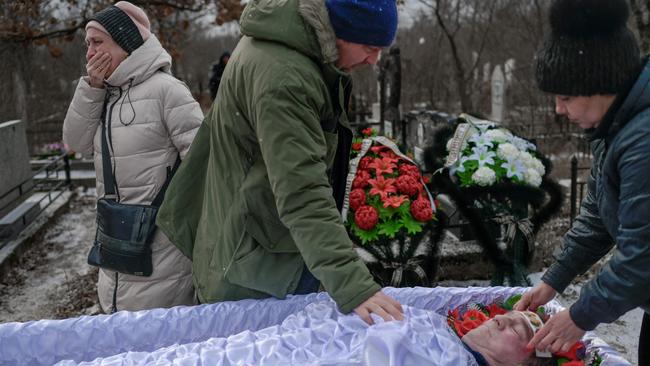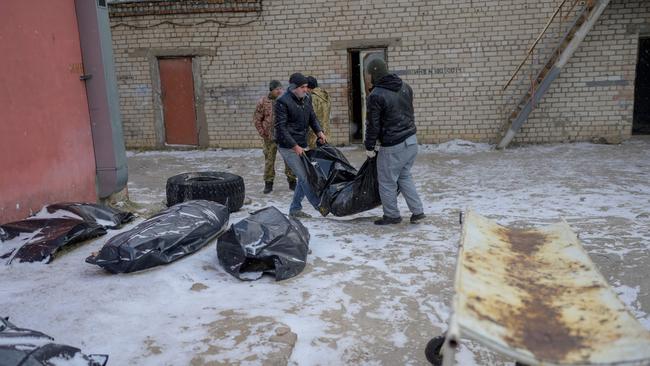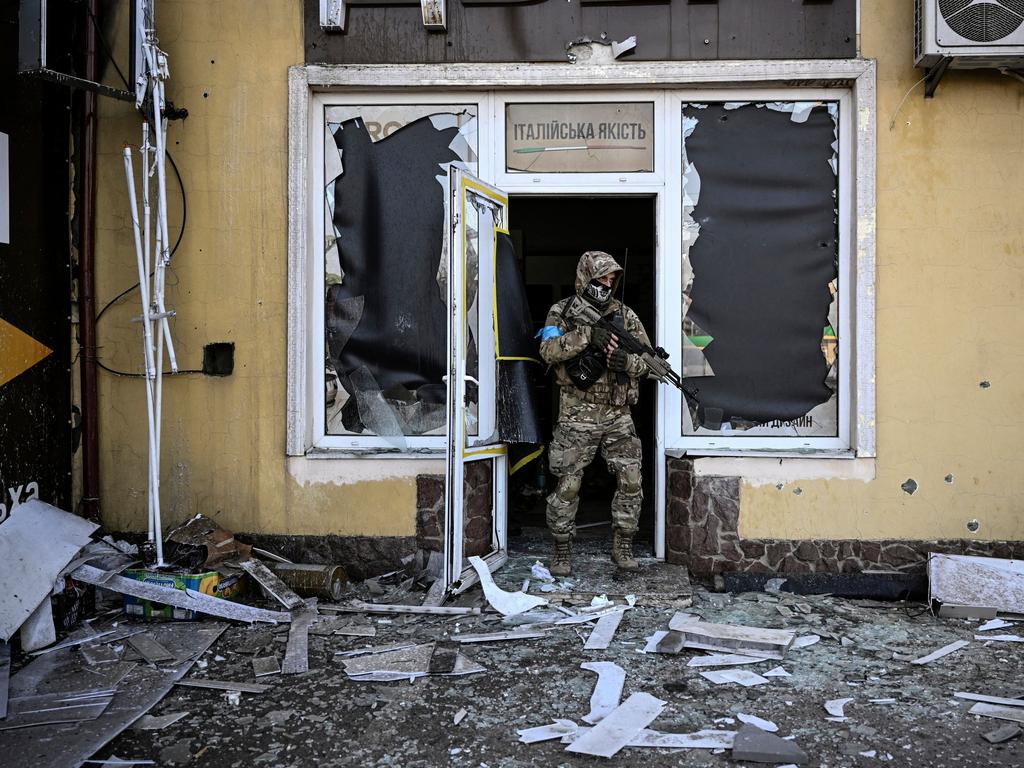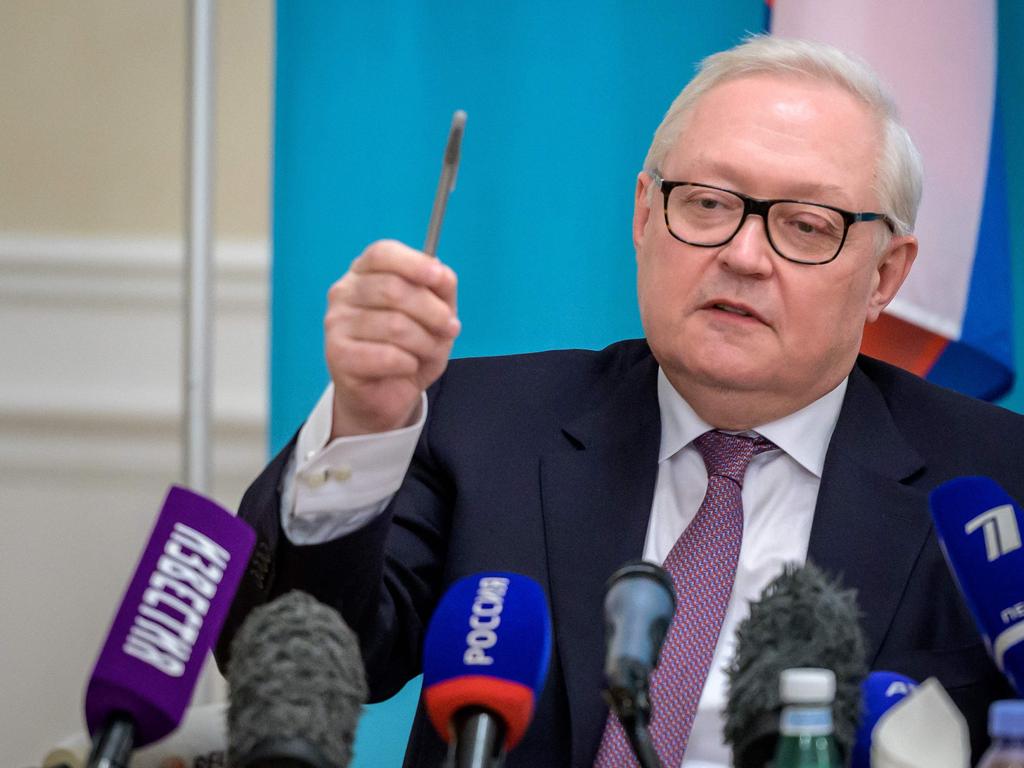Born to the sound of gunfire, the Ukraine babies defying the despair of war
As mourners pay their respects at the funeral of a man killed in shelling in Mykolaiv, new parents gaze in wonder at the miracles in their arms.

In a damp hospital basement in a city under attack, Alexei Silvestrov’s face broke into an awed smile as he held his new daughter, Maria, for the first time.
Through the thick concrete walls came the muffled pounding of artillery fire. “We’ll be together every day,” he whispered to her, just loud enough to hear.
Maria wriggled in her thick white blanket, and he laughed. “She’s dancing,” said Alexei, 26, who until two weeks ago ran a business fixing dental and medical equipment. “Just like she did in the womb, when she heard my voice.”
On the floor above, his wife, Elena, 28, a graphic designer, lay pale and immobile on a trolley eight hours after an emergency caesarean, performed in the half-light and under constant risk of bombardment.
If a missile hit now she could do nothing to protect herself. She was still too weak to go down to the shelter so staff had rolled her into a corridor of Mykolaiv Maternity Hospital No.3, away from the windows. A little earlier the air raid sirens had wailed and patients and hospital staff had rushed down to the bunker. But Alexei had stood by his wife, stroking her hair, until the all-clear sounded.
They are both Russian-speaking Ukrainians, the very people Vladimir Putin claims to be defending from Ukrainian nationalists. Until two weeks ago, they had been like any young couple getting ready for the arrival of a baby. Now, like everyone else in Mykolaiv, they were living hour to hour, consumed with fear, learning to dread the sound of incoming fire. “I never thought this would happen,” said Elena.
Doctors had delivered Maria that morning. What would in ordinary circumstances have been a routine operation was fraught with danger for everyone involved. Since the war began, bringing with it bombs and a shortage of medical equipment, the hospital staff have tried to avoid performing caesareans.
Most of the children born at the hospital are delivered in the cellars, which until two weeks ago were used to store patient records. Caesarean sections have to be carried out in the operating theatre on the fourth floor, where staff and patients are exposed to the possibility of projectiles and shrapnel. Every moment spent there is potentially fatal.
Day and night, the sound of shelling penetrates the building. Windows, covered in plastic and tape to stop light seeping out, shake in their frames. “This place is not very safe,” said Andriy Gribanov, an obstetrician and medical director of the hospital. “Because they just bomb everything.”
Gribanov had been on the 20th hour of his shift on Wednesday morning when an ultrasound showed Elena’s baby was in the breech position. Outside, there were loud explosions, mostly from outgoing artillery. Russian bombardment, the staff knew, could hit at any second. The sirens were sounding. They decided to operate anyway. In the surgical theatre, a team of eight – two surgeons, an anaesthetist, a midwife, a scrub nurse, two anaesthesia nurses and a neonatologist – went to work. “There was a risk of bombing,” Gribanov said. “But nevertheless, we needed to do the (C-section).”
Though the windows were covered, they dared turn on only some of the lights, afraid they could still shine through in the dark, and that they would be targeted.
“We work as quickly as we can, just to shorten the time of the surgery,” he said. “Because at any time it could start.”
Maria was delivered about 4.30am. “I was so happy,” Elena said. “She was so beautiful.”
Across the country, more than 4000 children have been born since the war began, according to the UN population agency, many of them in underground bunkers.
Twenty-six were born in Mykolaiv Maternity Hospital No.3, delivered by an exhausted team of doctors, nurses and medical staff constantly afraid of running out of basic medical supplies.
“It’s very emotionally hard for the mothers, they’re very frightened,” said Nadia Sherstova, 50, the chief anaesthesiologist, who has worked at the hospital for 30 years. “They’re very stressed, so that can make it hard to make enough milk for the babies.”
The staff are risking their lives too. Last week, 12 hours after Maria was born, a Russian missile struck the maternity hospital in the besieged eastern city of Mariupol. Three people, including a child, were killed.
Mykolaiv expects it will be next. The largely Russian-speaking city of half a million, which lies on the bank of the Bug river, 65km from the Black Sea, is holding the line against Russia’s westward advance, as the Kremlin’s forces attempt to sweep along the coast from Crimea, cutting Ukraine off from the sea. For the past week, Russian forces have been attempting to encircle the city, from where Ukrainian officials say they plan to cross the river and cut across to the port city of Odessa. They have not yet succeeded. But as the Russian advance creeps forward in the face of stiff Ukrainian resistance, Putin’s forces have rained down destruction on parts of the city.

In the grounds of the City Hospital, one of Mykolaiv’s largest, Konstantin Poliansky, an assistant to the director, walked through the falling snow to the mound in the earth where a projectile had landed two nights earlier. At 5am, he said, something had hit the ground, right above the shelter where patients and staff were hiding. He thought it was a Russian bomb, but it was impossible to be sure. “They just (target) anywhere, to any building,” he said. “They don’t have any goals or purposes, they just attack.”
Each day, the hospitals of Mykolaiv, and across the country, are filling with more victims of the Russian assault. In the Regional Children’s Hospital, on the southeastern edge of the city, three children – Irina, Sofia and Stas – lay in adjoining rooms on a dimly lit ward. All had been injured when their homes were hit.
Irina, 7, who lay on her side, had dressings wrapped around her left arm. Sofia, 13, her face pale, looked at us from under the bandages on the right side of her face, which had been hit by shrapnel.
“Doctors operated on these children, the surgeries lasted for six to seven hours, they put in an incredible effort to restore the loss of function in the arms and legs, brain function,” said Aleksander Yurevich, the medical director of the hospital. In the past week, 41 injured children have been brought in after Russian attacks, he said.
Stas, 12, was in bed, his face lacerated and yellow with bruises, his broken arm propped up. After his home was hit, he was brought to the hospital and survived a long operation. When I said hello, he gave me a weak thumbs-up. “I’m fine,” he said.
The nurses sitting with him cheered, trying to keep his spirits up. But they knew what he didn’t: the bombing he survived had killed his mother and sister.
THE SUNDAY TIMES






To join the conversation, please log in. Don't have an account? Register
Join the conversation, you are commenting as Logout